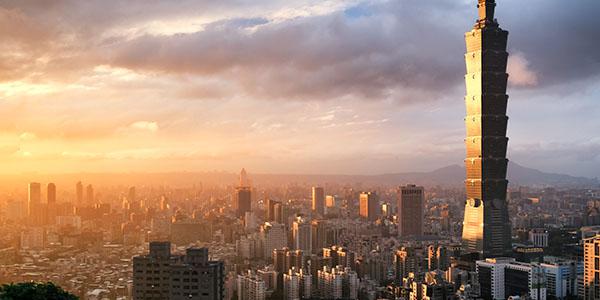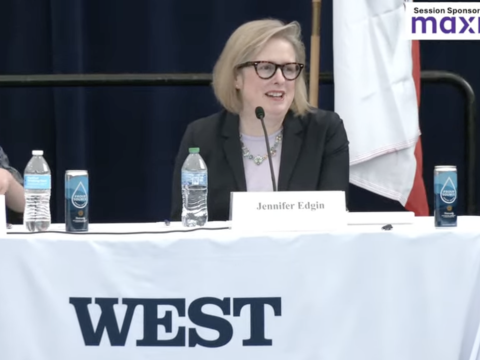China’s Growing Threat to Taiwan and the World
For 25 years, Rear Adm. Michael Studeman, USN, director, J-2, U.S. Indo-Pacific Command, has been sounding the warning bell about the government of China and the threat it brings to the world and the United States. The threat is real, and China’s intent is clear, the leader has warned. The United States must now examine the time elements associated with China’s dangerous moves, the intelligence leader says.
“For us, it isn’t that we haven’t diagnosed the challenge, or that we do not know the intent,” explained Adm. Studeman. “The question for everything is timing for [their] specific moves. There is a difference between strategic warning and operational and tactical warning. I feel comfortable that we have enough sensing in place to give us some amount of time, but the issue is even if you had, let's say, 90-days of strategic warning for Taiwan, whether or not we have postured ourselves, we have built up the capacities and capabilities that we need to be able to handle the type of scenario which may be unfolding. That has been part of INDO-PACOM’s feedback from multiple combatant commanders over time with regard to whether or not we are accurately understanding the time elements associated with the danger.”
Adm. Studeman, who is responsible for executing intelligence operations, identifying and assessing threats, and engaging partners in the Asia-Pacific region, spoke last week at an Intelligence and National Security Alliance event, outlining his intelligence priorities for the region.
He urged decision makers to put together the proper allocation of resources to address the problem of China that is only growing larger and larger. “The issue for us is that we have given strategic warning,” Adm. Studeman emphasized. “I'm reminded of the [Henry] Kissinger quote, ‘You have given me warning, but you have not persuaded me,’ and I am wondering in Washington how many folks are truly persuaded by the warning which the intelligence community has already provided regarding the dangers that exist with regard to the nature of the Chinese threat and how it manifests and what to do about it.”
In fact, the scale of the threat is immense, he continued. “We are mustering up our plans, policies, actions to deal with it, but the scale of it is incredible,” the J-2 stressed. “The breadth and scope and depth of it is absolutely awesome. The degree of action that we need to take is of the magnitude of what we applied in the previous century [in the Cold War] and we are not there yet as a nation in understanding how to in fact employ our energy… to be able to grapple with it.”
This situation especially applies to the steps China is taking against Taiwan, which includes economic pressure, information warfare and assertions against diplomatic ties.
“If you want to just talk Taiwan, the kinds of things they have done to change facts on the ground, the other elements of information [warfare], the economic leverage that they have been placing, it is already a struggle underway,” the admiral observed.
And whether China resorts to a military option against Taiwan is quite a distinct possibility. “To us, it is only a matter of time, and not a matter of ‘if,’” he said. “If you understand the problem set, you understand that Taiwan will unlikely fold based on economic and informational and diplomatic influence alone.”
However, it is not just the threat to Taiwan, the admiral continued.
“What we are warning about is danger on all fronts,” he stated. “[Taiwan] is one scenario, but you [need to] look at the degree of pressure that China is placing on a lot of its neighbors. And this idea that it is only a Taiwan scenario, versus many other areas where the Chinese are being highly assertive and coercive, is a failure in understanding complexity because it is not that simple.”
Moreover, the U.S. military should not just wait to have the warning of a Taiwan amphibious assault to then act, he said.
“I think that part of the problem is a larger one where frankly it is hard to get a lot of attention to certain kinds of scenarios,” Adm. Studeman said. “We, in the United States, see war as a historical anomaly. For the Chinese, Russians, Iranians, every day is a day of war in terms of the continuous struggle for advantage and disadvantage for influence. This is where we may be failing to see the real danger.”
He urged leaders to shift their thinking from 10, 15 or even five years ago, and instead understand China’s dream is to be a leading power and “the” only leading power, “surpassing the United States by almost any measure.” Leaders must comprehend and add the necessary U.S. infrastructure and investment needed.
“We must come to terms with the idea of how much awareness and sensing and analysis and production we need to do to provide better understanding of exactly where there may be approach points across key terrain countries and be able to understand developments in time to muster up action on our side whether it is informing, advising, shaping, influencing, but doing it in time to make a difference,” the J-2 said.
Adm. Studeman also warned that China can further its control domestically, growing its already capable control system in use by the People’s Armed Police, the Ministry of State Security and its other institutions. He marveled at the way in which China has since put its institutions in place to conduct widespread command and control and push out many simultaneous efforts.
“It is simply the way that they have structured themselves,” he said. “It is a monolithic society. There is a strong capability for them to do even more, whether you are talking Xiong'an or Hong Kong, those are emblematic of areas where the Chinese have essentially attempted to get ‘effective control.’ And this is a foreshadowing of what Chinese effective control will look like in other places. China is using the same techniques to establish effective control over the line of actual control with India or in the areas around Buton, which has not had a lot of press but should.”
He noted that India is strategically moving away from some of the alignments it has had with China, and that “there has been a warming” with the United States and other countries in the region. “We are working with them on a number of different fronts,” Adm. Studeman offered. “We have a shared interest in the dangers that China has presented. There are a lot more steps we can take along the road to strengthening the relationship with India, but it is stronger perhaps than it has ever been today. We do not intend to push beyond what New Delhi is willing to do. We very much respect where India is in their strategic interests.
“We have an obligation to make sure that we are increasing our preparedness every day for things that are happening in our theater now that are either advantageous to us or disadvantageous to us,” he concluded. “The accumulation of those advantages or disadvantages are very meaningful. That is the importance of readiness for a combat environment but also readiness for the day-to-day competition.”




Comments